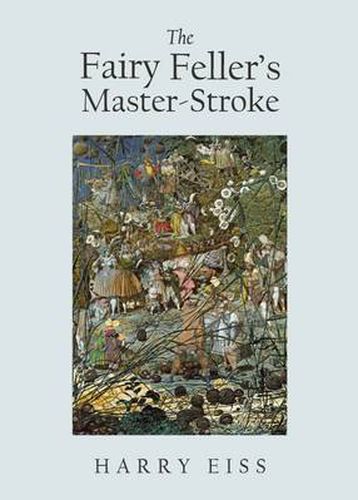Readings Newsletter
Become a Readings Member to make your shopping experience even easier.
Sign in or sign up for free!
You’re not far away from qualifying for FREE standard shipping within Australia
You’ve qualified for FREE standard shipping within Australia
The cart is loading…






Richard Dadd is a trickster, a pre-post-modern enigma wrapped in a Shakespearean Midsummer Night’s Dream; an Elizabethan Puck living in a smothering Victorian insane asylum, foreshadowing and, in brilliant, Mad Hatter conundrums, entering the fragmented shards of today’s nightmarish oxymorons long before the artists currently trying to give them the joker’s ephemeral maps of discourse.The author thinks of Bob Dylan’s Ballad of a Thin Man, that cryptic refusal to reduce the warped mirrors of reality to prosaic lies, or, perhaps All Along the Watchtower or Mr Tambourine Man. Even more than Samuel Beckett’s Waiting for Godot, which curiously enough comes off as overly esoteric, too studied, too conscious, Dadd’s entire existence foreshadows the forbidden entrance into the numinous, the realization of the inexplicable labyrinths of contemporary existence, that wonderfully rich Marcel Duchamp landscape of puns and satiric paradigms, that surrealistic parallax of the brilliant gamester Salvador Dali, that smirking irony of the works of Roy Lichtenstein, Robert Rauschenberg, John Cage, and Robert Indiana; that fragmented, meta-fictional struggle of Kurt Vonnegut’s Slaughterhouse Five.John Lennon certainly sensed it and couldn’t help but push into meta-real worlds in his own lyrics. Think of Strawberry Fields Forever,
I Am the Walrus, and the more self-conscious Revolution Number 9. In Yer Blues, he even refers to Dylan’s main character, Mr Jones from Ballad of a Thin Man. If Lennon’s song is taken seriously, literally, then it is a dark crying out by a suicidal man, Lord, I’m lonely, wanna die ; or, if taken as a metaphor for a lover’s lost feelings about his unfulfilled love, it falls into the romantic rant of a typical blues or teenage rock-and-roll song.However, even on this level, it has an irony about it, a sense of laughing at itself and at Dylan’s Mr Jones, who knows something is going on but just not what it is, and then, by extension, all of us who have awakened to the fact that the studied Western world doesn’t make sense, all of us who struggle to find meaning in the nonsense images, characters, and happenings in the song, and perhaps, coming to a conclusion that the nonsense is the sense.
$9.00 standard shipping within Australia
FREE standard shipping within Australia for orders over $100.00
Express & International shipping calculated at checkout
Richard Dadd is a trickster, a pre-post-modern enigma wrapped in a Shakespearean Midsummer Night’s Dream; an Elizabethan Puck living in a smothering Victorian insane asylum, foreshadowing and, in brilliant, Mad Hatter conundrums, entering the fragmented shards of today’s nightmarish oxymorons long before the artists currently trying to give them the joker’s ephemeral maps of discourse.The author thinks of Bob Dylan’s Ballad of a Thin Man, that cryptic refusal to reduce the warped mirrors of reality to prosaic lies, or, perhaps All Along the Watchtower or Mr Tambourine Man. Even more than Samuel Beckett’s Waiting for Godot, which curiously enough comes off as overly esoteric, too studied, too conscious, Dadd’s entire existence foreshadows the forbidden entrance into the numinous, the realization of the inexplicable labyrinths of contemporary existence, that wonderfully rich Marcel Duchamp landscape of puns and satiric paradigms, that surrealistic parallax of the brilliant gamester Salvador Dali, that smirking irony of the works of Roy Lichtenstein, Robert Rauschenberg, John Cage, and Robert Indiana; that fragmented, meta-fictional struggle of Kurt Vonnegut’s Slaughterhouse Five.John Lennon certainly sensed it and couldn’t help but push into meta-real worlds in his own lyrics. Think of Strawberry Fields Forever,
I Am the Walrus, and the more self-conscious Revolution Number 9. In Yer Blues, he even refers to Dylan’s main character, Mr Jones from Ballad of a Thin Man. If Lennon’s song is taken seriously, literally, then it is a dark crying out by a suicidal man, Lord, I’m lonely, wanna die ; or, if taken as a metaphor for a lover’s lost feelings about his unfulfilled love, it falls into the romantic rant of a typical blues or teenage rock-and-roll song.However, even on this level, it has an irony about it, a sense of laughing at itself and at Dylan’s Mr Jones, who knows something is going on but just not what it is, and then, by extension, all of us who have awakened to the fact that the studied Western world doesn’t make sense, all of us who struggle to find meaning in the nonsense images, characters, and happenings in the song, and perhaps, coming to a conclusion that the nonsense is the sense.